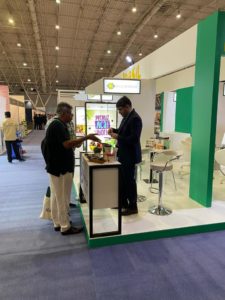São Paulo – Representatives of six Brazilian food companies are in Saudi Arabia exhibiting at the Saudi Halal Expo show in Riyadh, which opened this Monday (7) and runs until Wednesday (9). Organized by the Arab Brazilian Chamber of Commerce (ABCC) and the Brazilian Trade and Investment Promotion Agency (ApexBrasil), the participation is part of the Halal do Brasil project, an agreement between the institutions to promote Brazilian foodstuffs in Islamic markets.

The mission includes an açaí berry producer, Petruz Açaí, a cattle and sheep meatpacking company, Come Sul, in addition to four foreign trade holdings, Pantanal Trading, Garra Internacional, Nad Al Shiba, and SCG, which have bulk and processed food products from Brazilian companies in their portfolios.
They already operate in Arab countries, but most still do not have Saudi customers. “The expectation is to make direct connections with retailers and importers at the show, providing a value-added ‘Made in Brazil’ product, meeting the values of the Muslim consumer,” explained Silvana Scheffel Gomes, marketing & content director of the ABCC.
According to her, the mission to the Saudi show is part of a series of trade promotion activities to expand the export of value-added products, which are not predominant in the trade between Brazil and Muslim countries, which mainly buy foodstuffs such as sugar, grains, fruit, and animal protein.
In 2021, these products led the Brazilian export basket to the 57 countries of the Organization for Islamic Cooperation (OIC), totaling USD 16.5 billion or 7.2% of the total USD 230.4 billion imported by the bloc. The result positioned Brazil as the second leading supplier of foodstuffs and beverages to the OIC, trailing only behind India.
In the assessment of the ABCC director, although representative, the result could have been better if Brazilian shipments had a more excellent supply of processed foods with halal certification, which attests to production following the customs of Islam, and works, in practice, as a passport for access to the Muslim world.
Halal do Brasil

Halal do Brasil is a project by the ABCC in partnership with ApexBrasil, which aims to accelerate the process of inserting halal products into global markets, boosting the Brazilian export culture to Islamic and non-Islamic markets through a project of international business support.
The initiative anticipates an investment of BRL 15.4 million (about USD 3.04 million at the current rate) over the next 30 months in trade promotion actions at food shows held in Muslim countries and subsidies to Brazilian food companies seeking to obtain halal certification for their products.
The goal is to enable 500 industrialized food and beverage producers already in the internationalization phase to participate in the global halal food market, which, according to the State of the Global Islamic Economy 2022, congregates 1.9 billion consumers, with a flow of USD 1.267 trillion a year and expected to grow 7.1% by 2025.
Translated by Elúsio Brasileiro




